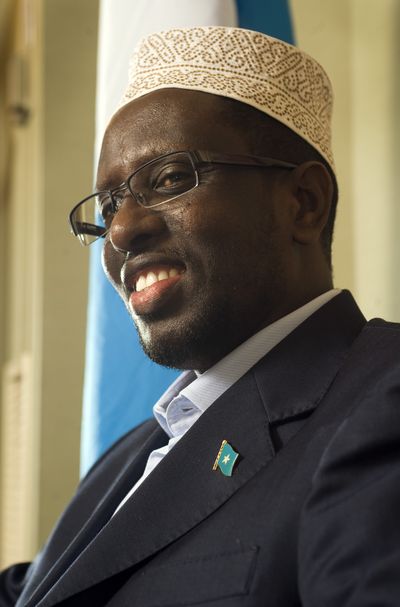Somali president blasts terror recruiting
Men ‘robbed’ of their lives, Ahmed says in Minnesota

ST. PAUL, Minn. – The president of Somalia on Sunday denounced the recruiting of young men from Minnesota’s huge Somali community for terrorist activity in his war-ravaged homeland, and said he plans to work with the U.S. government to bring those still alive back home.
President Sheik Sharif Sheik Ahmed spoke with the Associated Press while visiting the Minneapolis area, where authorities believe as many as 20 young Somali men – possibly recruited by a vision of jihad to fight – returned to the impoverished nation over the last two years.
At least three have died in Somalia, including one who authorities believe was the first American suicide bomber. Three others have pleaded guilty in the U.S. to terror-related charges.
“We believe this is a wrong action, that these young men were wronged, they were robbed out of their life. Their parents were wronged,” Ahmed told the AP through an interpreter. “The laws of the United States were violated. The security of Somalia was violated. So we condemn (them) without reservation.”
Ahmed was in the Minneapolis area – home of the largest Somali population in the U.S. – to build support as his government tries to bring peace to the Horn of Africa country that has been plagued by violence for decades. The nation of 7 million people has not had a functioning government since 1991, when clan-based warlords overthrew a dictator and then turned on each other.
Ahmed was elected by Somalia’s parliament in January, but his government has little control. A group called al-Shabab, which the U.S. says has ties to al-Qaida, has taken over most of Somalia and boosted its numbers with foreign fighters. There are near-daily battles in Mogadishu, the country’s capital, and tens of thousands of civilians have died.
Many of the country’s former leaders, scholars and other dignitaries relocated to the Minneapolis-St. Paul area. Many were educated and started successful businesses in the region and send millions of dollars back to Somalia.
The Somali community in Minnesota numbered 35,000 in 2007, according to the census.
Ahmed said the young men who left the area “were stolen and taken without the knowledge of their parents and imams.” He said he met with imams from area mosques and “we agreed that they were really sorry with what happened, which tarnished their image and that of our religion.”
He said the Somali government agrees to work with state and federal governments, as well as imams and parents, to prevent more recruiting.
When asked what the Somali government could do to help, he said, “We hope to reach out to these young men and explain to them how wrong what they are doing is, and that they should return to the safety of their families.”